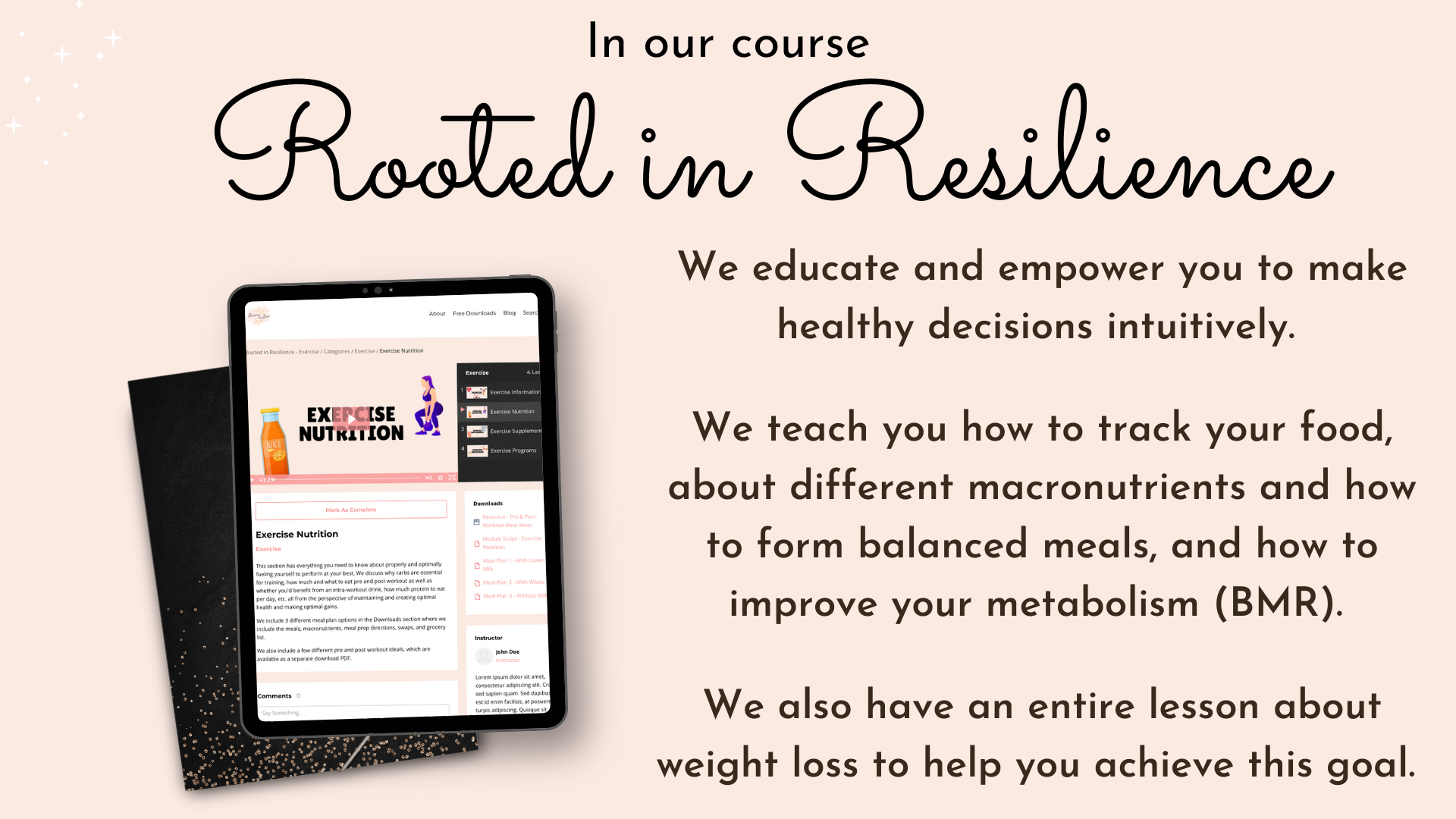How to lose weight
Aug 02, 2022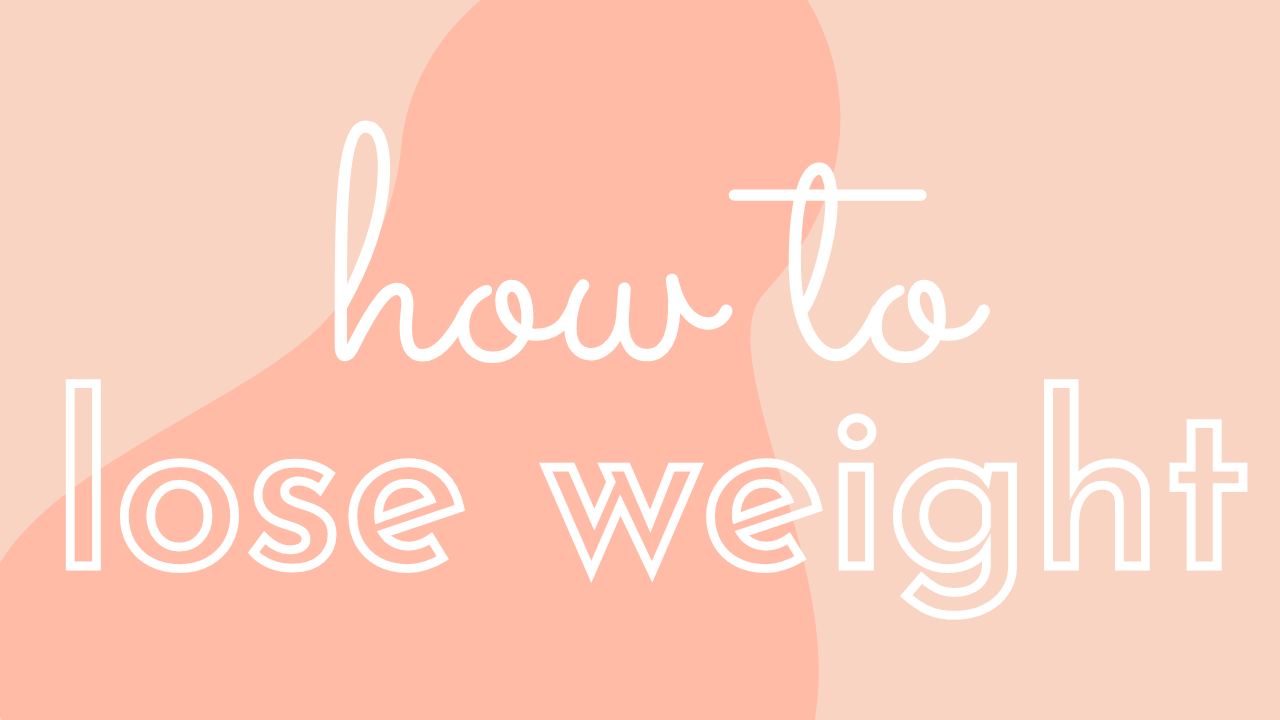
The question of ‘How to lose fat?’ seems to be a popular question these days.
And before diving into how this is accomplished (below), you should first assess whether you are even at a place where weight loss should be a goal.
You should master the basics first, which will then make your weight loss journey more successful, easier, sustainable, and enjoyable.
Basics:
- Understand how to form balanced meals and get a rough idea as to how much food you are eating in a given day.
- Make regular walks part of your daily routine. Shoot for 8-10k. One way to work on this is to go for 10 minute walks after each meal.
- Implement strength training (not HIIT or excessive cardio) 2-4 times each week.
- Prioritize sleep.
Mastering these will help you get your body to work for you, not against you. (more about that in this blog post).
Do not start a weight loss journey until you have at least accomplished the above. Without these, you will be in a never ending hamster wheel of unsuccessful weight loss.
Weight loss should be a temporary goal, not a lifestyle.

So, let's get into it - how do you lose weight? (lose fat)
For some people it seems to be a mystery. But in the grand scheme of things, it really is quite simple (not necessarily easy!) if you have the basics in place and are in a good place metabolically to be able to lose weight.
The anti-calorie folks won’t like this - but you will only lose weight if you consume fewer calories than you burn.
A calorie is just a unit of energy. The whole goal of our metabolism is to extract this energy from our food.
The Law of Thermodynamics applies here: energy can neither be created or destroyed.

With all of the food you eat - something has to happen to that food, it doesn’t just ‘poof’ go away. So consuming extra energy (calories) than your energetic demands will be stored as fat for future use.
What does the research say? When variables are controlled and study subjects are provided all of their meals for the study duration, calories in vs. calories out applies. If a study relies on food journals where study participants are supposed to accurately report their food outside of the lab, mixed results can occur. People aren’t good at accurately reporting what they eat!
Yes, there are other factors (that we will dive into below), but calories do matter as no one is an exclusion from the energy balance equation.
What is energy balance?
Energy is another word for "calories." Your energy balance is the balance of calories consumed through eating and drinking (energy intake) compared to calories burned (energy expenditure).
Your energy expenditure contains 4 main parts as shown in our image below. There are certain health states that can reduce your energy expenditure, making it harder to lose weight (which we will dive into more below). But that doesn't mean the energy balance doesn't apply - it applies to everyone.
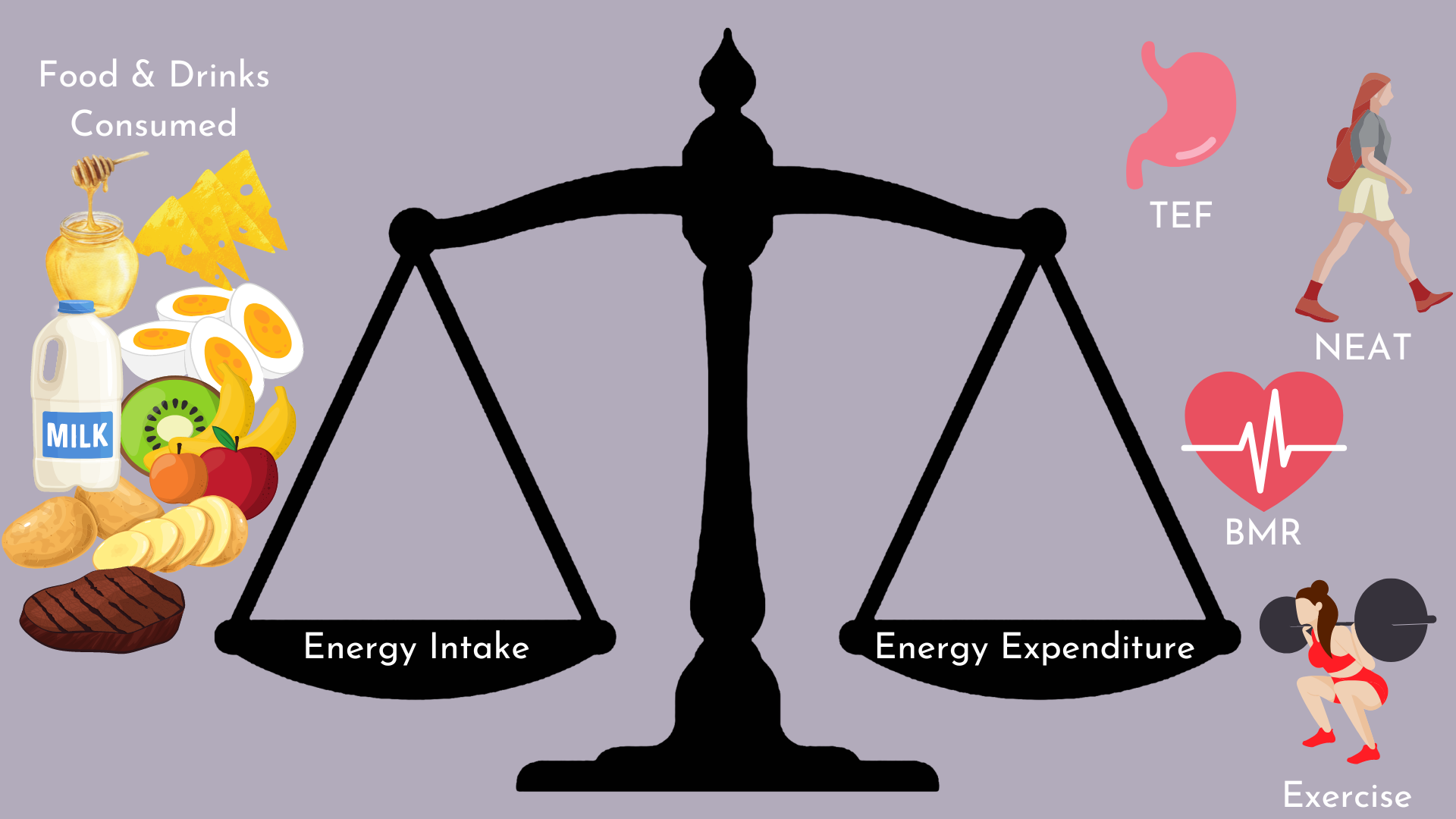
Your Energy Intake refers to the sum of all calories consumed from food and drinks (milk, fruit juices, alcohol, etc.)
The 4 components of Energy Expenditure include:
- Exercise = the energy your body uses for planned physical activity, whether that is strength training, playing sports or a cardio session. You actually don't burn many calories during a strength training session - and the goal isn't to burn calories. The goal is to elicit a muscular adaptation to then increase the amount of lean mass (muscle) you have, and thus increase your metabolism.
- NEAT = Non Exercise Activity Thermogenesis, which refers to the energy expended for movement outside of exercise. This includes folding laundry, cleaning the house, taking your dog on a walk, fidgeting at your desk (and other spontaneous movements), etc.
- Calories burned from NEAT will vary A LOT. More active individuals (higher daily step counts) will burn more calories due to higher levels of NEAT.
- In fact, occupations relying on intense physical activity can expend 1500 cal more than a sedentary job (ref). And Dr. Levine has shown that NEAT can vary by up to 2000 calories per day between two individuals of the same size! (ref)

- This image shows some examples of calories burned per hour of various NEAT activities (ref)

- BMR = Basal Metabolic Rate, which refers to the energy required for your body to maintain basic function. This includes breathing, digesting food, pumping blood throughout the body, maintaining strong hair and nails, etc. This accounts for 65-70% of your total daily expenditure - making it the largest contribution to the energy expenditure equation. Increasing your metabolic rate is one of the best ways to make weight loss and maintenance more sustainable in the long run.
- TEF = the Thermic Effect of Food, referring to the energy used by your body to digest, absorb, and metabolize food. The TEF varies based on the foods you eat (ref), but it is estimated that around 10% (ref) of the calories you eat are used to power digestion if you eat a balanced, mixed diet.
-
Fat provides 9 calories per gram, and its TEF is 0–3%
-
Carbohydrate provides 4 calories per gram, and its TEF is 5–10%
-
Protein provides 4 calories per gram, and its TEF is 20–30%
- Thus, a diet high in carbs and protein will produce the highest TEF value. But this impact is minimal relative to BMR, exercise & NEAT.
-
The diagram below (from ref) demonstrates the relative contribution of each of the above 4 in total energy expenditure. Your basal metabolic rate and daily activity levels are two levers that can be used to help increase your energy expenditure levels.
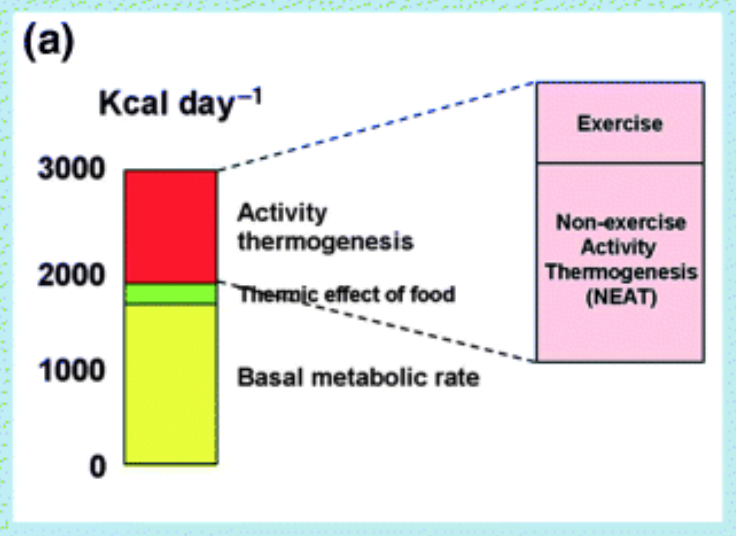
The balance between your energy intake and energy expenditure overtime will determine whether you maintain, lose or gain weight.
- More IN than OUT over time = weight gain
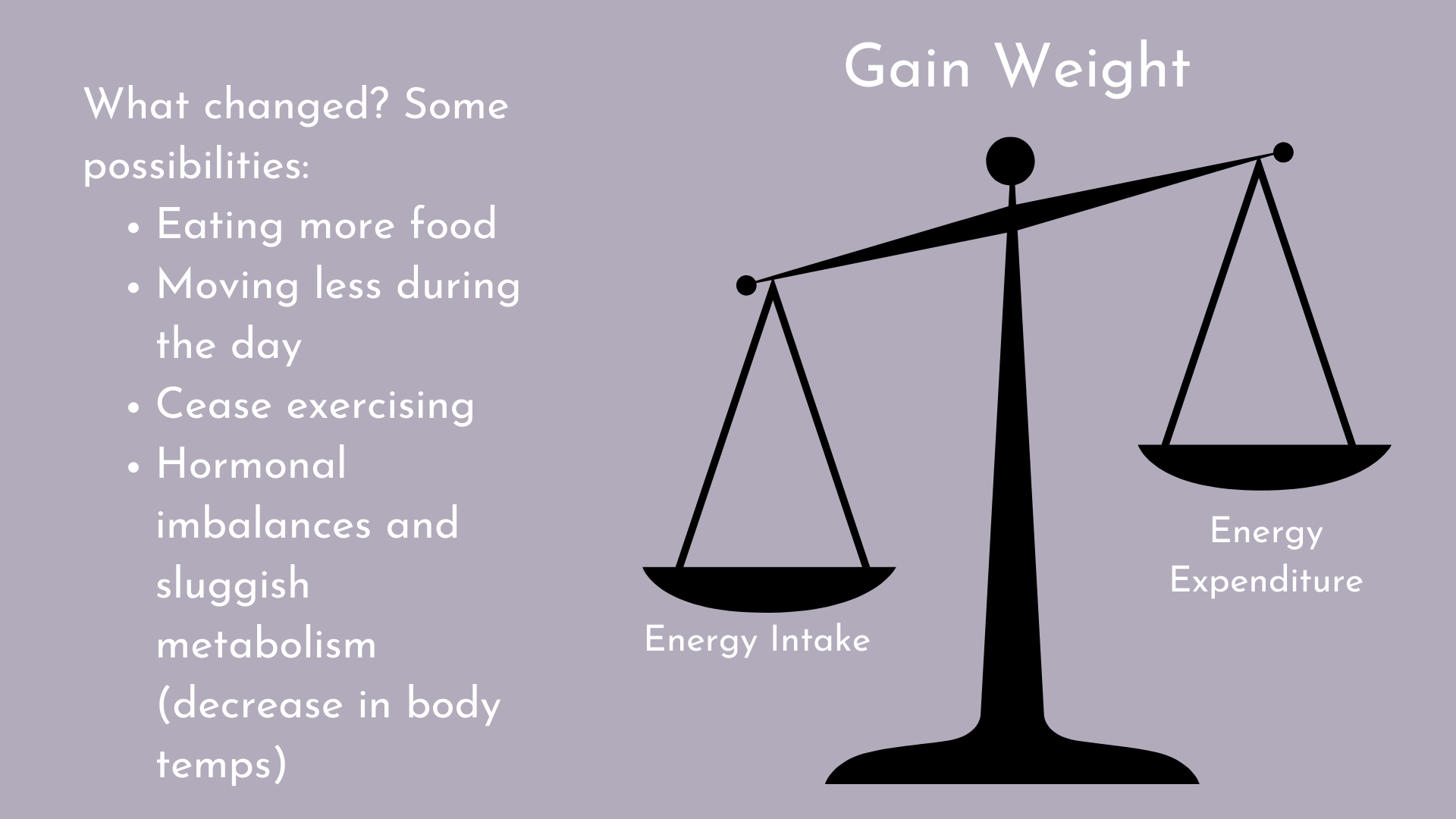
- More OUT than IN over time = weight loss
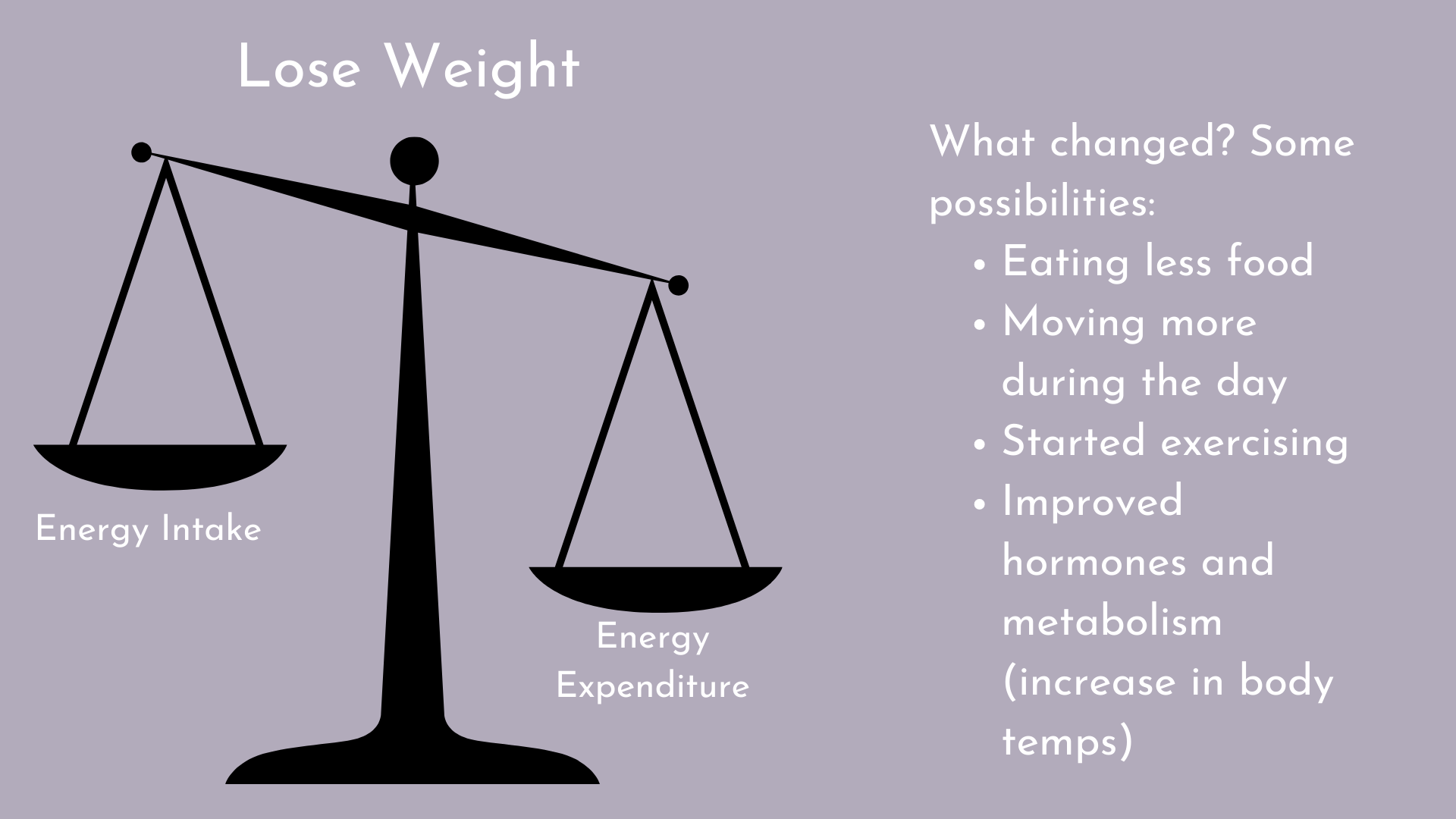
- Similar IN and OUT over time = weight maintenance (note: your maintenance calories are typically a range, not a specific number)
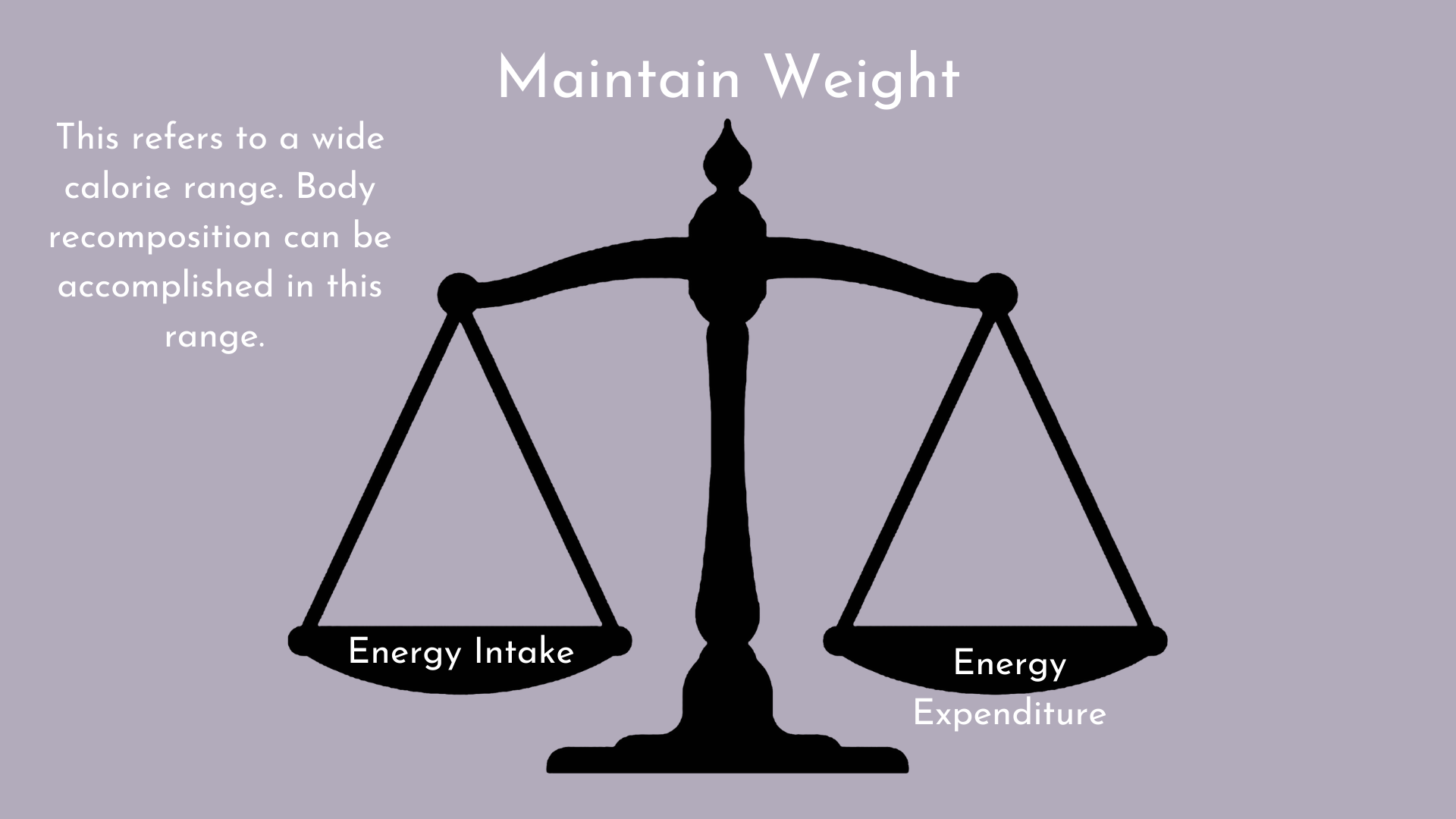
Once again, no one is an exception to the energy balance equation.
Once your body’s energy needs are met, extra calories are stored for future use — mainly as fat. You cannot get around this scientific principles.
Thus, eating more calories than you burn will cause you to gain weight, whereas eating fewer than you need will cause weight loss. (ref)
Some Criticisms
Here is a criticism of 'calories in vs. calories out' from a Professor from Stanford:

I agree with the last two sentences! Of course there is nuance.
But that does not mean that the energy balance still doesn't apply. It means that your energy expenditure is severely hindered by a poor metabolism and unbalanced hormones.
Thyroid hormones are the master regulator of body metabolism. With a sluggish thyroid system, your BMR will be low.
Meaning, your body doesn't burn many calories.
So, in order to lose weight, you would need to consume a very low calorie diet - which is unsustainable. Meaning, your current state of your metabolism is not setting you up for success to lose weight.
Having unbalanced hormone levels can also make someone feel pretty crappy, which can limit your daily activity level and thus, decrease your energy expenditure through NEAT and exercise. (Who wants to move around and be active when they feel pretty crappy??)
You can generate more energy when your hormones are balanced. In fact, having higher thyroid hormone levels leads to a higher metabolic rate. (ref)
The current state of your metabolism and hormones can make it harder or easier to maintain, gain or lose weight.
So weight loss should not be your immediate goal - fixing your metabolism should be. Focus on the four 'basic' principles listed above, first.
And yes, your food choices (the source of calories) will also impact how your body produces energy and your hormones (thus impacting your BMR).
The whole point of a “pro metabolic/Ray Peat” nutrition strategy is to improve how your body generates energy and maintain balanced hormones. When you become aware of better food choices and balanced meals, you can work to maximize your BMR.
Processed crap will not be satiating and will make it easier to overeat. But thats not food - why are you eating that?
Eat real food.
Nutrient density is also important since our body needs nutrients to be able to properly make energy. Regularly including nutrient-rich superfoods (like oysters, liver, dairy, eggs, fruit, and animal products) is important to avoid nutrient deficiencies.
Eating a lot of empty calories (like salads) can lead to nutrient deficiencies and hinder energy production (and decrease your BMR).
Tracking Energy Intake
The only accurate way to monitor your ‘calories in’ (energy intake) is by tracking your food. Which many people label as ‘restrictive’ because they don’t know anything about it.
But studies show people underestimate how much they eat by 50%. Meaning, they consume a lot more calories than they think they do.
Tracking macros helps build awareness of your food choices and give us data on your energy intake levels.
Tracking macros involves having a target carb, fat and protein goal for each day. Hitting these macronutrient targets will thus allow you to hit an overall calorie goal. For example: 300 g carbs, 65 g fat, and 140 g protein equates to 300 * 4 + 65 * 9 + 140 * 4 = 2345 calories.
Tracking macros does require some effort. But it makes you accountable and consistent. Hard truth - people don’t like that responsibility. They want an excuse as to why they can’t lose weight.
If what you are doing now is working - then why do you want to lose weight? To elicit a change in your physique, you have to change your daily behaviors.
Tracking your food will make you more accountable and consistent, since when you observe something (monitor your food intake), you change behavior. You will almost instantly start making better food choices when you learn how to track your food.
And no, tracking is not restrictive or boring. You can and should include all your favorite foods like chocolate, sourdough bread, steak, eggs, ice cream, etc. All you have to do is account for it in your total daily energy intake.
If your nutrition strategy isn’t sustainable longterm then it will never work.
Tracking macros helps you eat an amount of food that is appropriate for your current energy expenditure (which remember, we can change over time!)
If you don’t want to track your macros then you are going to make this process harder on yourself.
When done properly it is a tried and true method of achieving physique, performance and life goals. You are able to find where your body is at, avoiding massive overshoots for weight loss and weight gain, ultimately keeping your metabolism in check.
Yes you can lose weight with a large caloric deficit (1000, 1200 calories a day), but that will have negative effects on your metabolism and bodily functions in the long run.
However, it will take some time to gauge and determine your maintenance calories. You cannot compare your calorie intake or maintenance to anyone else since everyone has different BMRs and daily activity levels.
Once you find your maintenance calories, try eating in a 300-500 calorie deficit per day.
Again, if your maintenance is 1600 calories, eating 1200 calories a day (a 400 calorie deficit for you) is not healthy and sustainable. You should work on increasing your maintenance calories slowly for a period of time before entering a weight loss phase.
The calorie range required to lose weight at the start of your journey may change during your weight loss phase since your BMR will change along with your weight loss. As you lose weight, your BMR will go down. As you gain muscle, your BMR will go up. So your energy intake to elicit a calorie deficit will have to adjust, too.
Increasing Energy Expenditure
In addition to gauging what your maintenance calories are, work on increasing your daily energy expenditure.
Being active isn’t just good for ‘burning calories’ - but it also helps blood flow, improves recovery, improves carb utilization, reduces blood sugar, and leads to better mental focus.
My two biggest tips that you should start today or this week:
- Go for a walk after each meal. Try to hit minimum 8k steps per day, shoot for 10k
- Start strength training. Building more muscle will increase our BMR sine muscle tissue requires more energy at rest. Building muscle requires following a program with progression, to provide an increasing stimulus on your muscle to elicit a change (growth). We dive into this and include strength training programs for all levels in our course - check it out.
These two changes will improve your health and will help your body work for you during your weight loss phase.
Some tips on getting active:
- Go for a walk after each meal
- Start a strength training routine
- Volunteer at a farm on weekends
- Get a dog
- Start an active, outdoor hobby
In Summary
In order to lose weight you need to tip the energy balance scale and be in a caloric deficit. You must be consuming less calories than your body is using. You can’t get around this scientific fact.
There are certainly ways to make this process a lot easier and more sustainable. But you must meet your body with where its at.
Gaining an understanding of where your body is at currently will help you make the best food decisions to avoid a massive overshoot and simultaneous weight gain. This involves tracking your food intake (the amount of carbs, fats and protein you consume each day) and determining your 'maintenance calories' - the amount of calories you can eat while maintaining your weight.
Learn more about our course, Rooted in Resilience.

